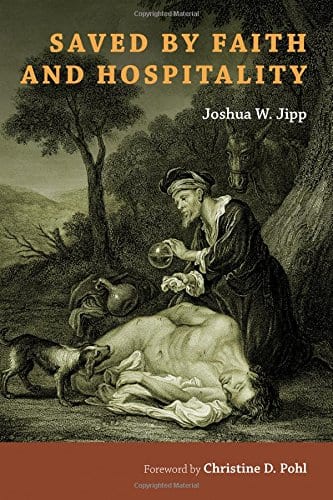Joshua Jipp is an associate professor of New Testament at Trinity Evangelical Divinity School. He will be a workshop leader at the upcoming Honor-Shame Conference in June 8-10, 2020. This post spotlights a few areas of his research with particular relevance for honor and shame. I won’t be surprised if Joshua Jipp also spurs ongoing conversation following the upcoming conference.
Saved by Hospitality?
Jipp’s work is timely as it is accessible. His book Saved by Faith and Hospitality was named 2018 Book of the Year Award by The Academy of Parish Clergy. Hospitality is one of those critical yet oft overlooked aspects of honor and shame.
Hospitality literally made Marcus Luttrell became “Lone Survivor” after Taliban insurgents killed and ambushed his Navy SEAL reconnaissance team. Just when Luttrell was barely hanging onto life, Mohammad Gulab, an Afghan villager, found him and protected Luttrell from the Taliban, who then threatened Gulab’s family and village. In Pashtun culture, hospitality is a central, even sacred, virtue.
 Likewise, so few Christians today understand that hospitality to strangers and the marginalized is an essential part of the church’s identity. In Saved by Faith and Hospitality, Jipp argues that God’s relationship to his people is fundamentally an act of hospitality to strangers. He surveys several biblical passages, portraying Christ as the divine host who extends God’s welcome to all people. He then invites us to consider how God’s hospitality sets the pattern for human hospitality.
Likewise, so few Christians today understand that hospitality to strangers and the marginalized is an essential part of the church’s identity. In Saved by Faith and Hospitality, Jipp argues that God’s relationship to his people is fundamentally an act of hospitality to strangers. He surveys several biblical passages, portraying Christ as the divine host who extends God’s welcome to all people. He then invites us to consider how God’s hospitality sets the pattern for human hospitality.
I recently heard someone say we humans have a hardwired sense of “stranger danger.” This is precisely what Jipp helps us to think about. His work should spur us to reflect seriously on topics such as immigration, ministering to refugees, overcoming tribalism (whether Western or non-Western), and even our use of resources.
We tend to think about hospitality from the perspective of the host; however, Jipp highlights the importance of being a good guest. This is a particularly relevant topic for those who live and work among people from other cultures.
The King of Glory
In Christ Is King: Paul’s Royal Ideology, Jipp first looks at Greco-Roman and Jewish depictions of the ideal king. He then explains how this background influences several aspects of Paul’s thought. These include hymning to the king, the royal roots of Paul’s language of participation “in Christ,” and his portrayal of Christ as the just, faithful, and enthroned king.
In the ancient Roman world, people bestowed divine honors upon kings and emperors. Such authorities served as powerful benefactors. Interestingly,
Evidence for the composition and singing of hymns increases in the age of imperial Rome, as hymns form a major component of emperor worship—so much so that these duties were given to a professional hymn writer for emperors, referred to as a θεολόγος or σεβαστολόγος. One of the responsibilities of the θεολόγος was to publicize the emperor’s benefactions, powers, and achievements by composing hymns that would then be sung by choirs at provincial imperial cults. (Kindle Loc 2125-30)
 Dynamics like these influence the way people understood (and presented) Christ in the ancient world.
Dynamics like these influence the way people understood (and presented) Christ in the ancient world.
In Christ Is King, Jipp examines Paul’s letters in particular. He helps us understand how certain terms and ways of speaking would be understood by the early church. For example, Jipp writes,
The logic of Philippians trades on the notion that Christ’s subjects benefit from his rule if they manifest the same royal virtues Christ himself displayed. The church confesses Christ alone as their ruler, for he is “Lord Jesus the Messiah” (2:11).
He has entered into his cosmic lordship, received the divine name, and been exalted above every other power (2:9-11), but not through any lust for power or divine honors and benefits. Christ has, rather, redefined true power, authority, and rule through his obedient acceptance of public humiliation in service to God and to others.
His teaching on Romans complements my work in Reading Romans with Eastern Eyes. For instance, what was ideal for which ancient Mediterranean rulers aspired? Jipp says,
“One of the standard responsibilities of ancient kings was the task of enacting justice for his people. One of the goals of the king is to create and facilitate a just and peaceful rule over his people…. The king’s devotion to justice is necessary because his vocation is to mirror the deity as an agent of the divine; since the gods love justice, so is the king to mirror divine justice.” [Ch. 5]
Accordingly, he observes,
“It is no surprise that one important aspect of imperial propaganda legitimating Augustus’s rule was the presentation of him as the supremely just ruler.”
What does this look like in the Bible?
Let’s not forget that the word “gospel” in the ancient world had royal, thus political, connotations. Readers frequently associate words like “righteousness” and therefore contrast it with honor-shame language. However, this is a false dichotomy, since righteousness-language is regal, not merely legal.
God manifests glory via His establishing righteousness. Jipp explains,
“God’s righteousness, or the king’s enactment of justice, often entails salvation, deliverance, and freedom, or alternatively, shame, destruction, and dishonor.” (Kindle Loc 5449)
Furthermore,
“Paul’s lack of shame, then, derives from his belief that the powerful revelation of God’s righteousness has vindicated the righteous one and brought divine wrath and judgment upon the wicked. Paul is not ashamed of God’s gospel precisely because he has seen its power unveiled in the Messiah’s deliverance from shame and disgrace—an event that carries that same power for those who belong to the Messiah.” (Kindle 5915-19)
To participate in Jipp’s workshop and join us at the 2020 Honor-Shame Conference, click here.












